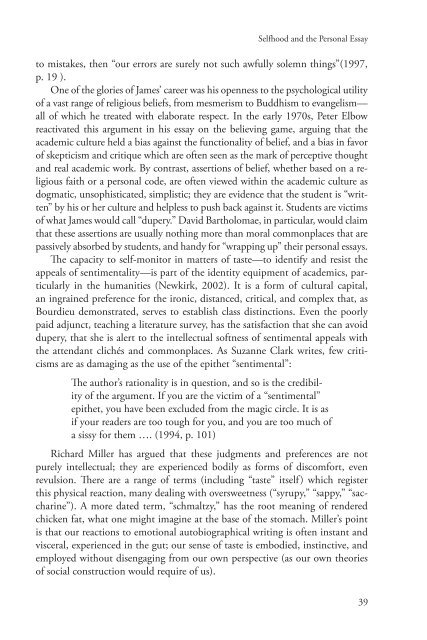Critical Expressivism- Theory and Practice in the Composition Classroom, 2014a
Critical Expressivism- Theory and Practice in the Composition Classroom, 2014a
Critical Expressivism- Theory and Practice in the Composition Classroom, 2014a
Create successful ePaper yourself
Turn your PDF publications into a flip-book with our unique Google optimized e-Paper software.
Selfhood <strong>and</strong> <strong>the</strong> Personal Essay<br />
to mistakes, <strong>the</strong>n “our errors are surely not such awfully solemn th<strong>in</strong>gs”(1997,<br />
p. 19 ).<br />
One of <strong>the</strong> glories of James’ career was his openness to <strong>the</strong> psychological utility<br />
of a vast range of religious beliefs, from mesmerism to Buddhism to evangelism—<br />
all of which he treated with elaborate respect. In <strong>the</strong> early 1970s, Peter Elbow<br />
reactivated this argument <strong>in</strong> his essay on <strong>the</strong> believ<strong>in</strong>g game, argu<strong>in</strong>g that <strong>the</strong><br />
academic culture held a bias aga<strong>in</strong>st <strong>the</strong> functionality of belief, <strong>and</strong> a bias <strong>in</strong> favor<br />
of skepticism <strong>and</strong> critique which are often seen as <strong>the</strong> mark of perceptive thought<br />
<strong>and</strong> real academic work. By contrast, assertions of belief, whe<strong>the</strong>r based on a religious<br />
faith or a personal code, are often viewed with<strong>in</strong> <strong>the</strong> academic culture as<br />
dogmatic, unsophisticated, simplistic; <strong>the</strong>y are evidence that <strong>the</strong> student is “written”<br />
by his or her culture <strong>and</strong> helpless to push back aga<strong>in</strong>st it. Students are victims<br />
of what James would call “dupery.” David Bartholomae, <strong>in</strong> particular, would claim<br />
that <strong>the</strong>se assertions are usually noth<strong>in</strong>g more than moral commonplaces that are<br />
passively absorbed by students, <strong>and</strong> h<strong>and</strong>y for “wrapp<strong>in</strong>g up” <strong>the</strong>ir personal essays.<br />
The capacity to self-monitor <strong>in</strong> matters of taste—to identify <strong>and</strong> resist <strong>the</strong><br />
appeals of sentimentality—is part of <strong>the</strong> identity equipment of academics, particularly<br />
<strong>in</strong> <strong>the</strong> humanities (Newkirk, 2002). It is a form of cultural capital,<br />
an <strong>in</strong>gra<strong>in</strong>ed preference for <strong>the</strong> ironic, distanced, critical, <strong>and</strong> complex that, as<br />
Bourdieu demonstrated, serves to establish class dist<strong>in</strong>ctions. Even <strong>the</strong> poorly<br />
paid adjunct, teach<strong>in</strong>g a literature survey, has <strong>the</strong> satisfaction that she can avoid<br />
dupery, that she is alert to <strong>the</strong> <strong>in</strong>tellectual softness of sentimental appeals with<br />
<strong>the</strong> attendant clichés <strong>and</strong> commonplaces. As Suzanne Clark writes, few criticisms<br />
are as damag<strong>in</strong>g as <strong>the</strong> use of <strong>the</strong> epi<strong>the</strong>t “sentimental”:<br />
The author’s rationality is <strong>in</strong> question, <strong>and</strong> so is <strong>the</strong> credibility<br />
of <strong>the</strong> argument. If you are <strong>the</strong> victim of a “sentimental”<br />
epi<strong>the</strong>t, you have been excluded from <strong>the</strong> magic circle. It is as<br />
if your readers are too tough for you, <strong>and</strong> you are too much of<br />
a sissy for <strong>the</strong>m …. (1994, p. 101)<br />
Richard Miller has argued that <strong>the</strong>se judgments <strong>and</strong> preferences are not<br />
purely <strong>in</strong>tellectual; <strong>the</strong>y are experienced bodily as forms of discomfort, even<br />
revulsion. There are a range of terms (<strong>in</strong>clud<strong>in</strong>g “taste” itself) which register<br />
this physical reaction, many deal<strong>in</strong>g with oversweetness (“syrupy,” “sappy,” “sacchar<strong>in</strong>e”).<br />
A more dated term, “schmaltzy,” has <strong>the</strong> root mean<strong>in</strong>g of rendered<br />
chicken fat, what one might imag<strong>in</strong>e at <strong>the</strong> base of <strong>the</strong> stomach. Miller’s po<strong>in</strong>t<br />
is that our reactions to emotional autobiographical writ<strong>in</strong>g is often <strong>in</strong>stant <strong>and</strong><br />
visceral, experienced <strong>in</strong> <strong>the</strong> gut; our sense of taste is embodied, <strong>in</strong>st<strong>in</strong>ctive, <strong>and</strong><br />
employed without disengag<strong>in</strong>g from our own perspective (as our own <strong>the</strong>ories<br />
of social construction would require of us).<br />
39


















